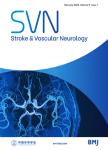Remote ischaemic conditioning for stroke: unanswered questions and future directions
作者机构:Cerebrovascular MedicineThe University of Sheffield Institute for Translational NeuroscienceSheffieldUK NeurosciencesSheffield Teaching Hospitals NHS Foundation TrustSheffieldUK Faculty of Medicine and DentistryUniversity of SheffieldSheffieldUK Geriatrics and Stroke MedicineSheffield Teaching Hospitals NHS Foundation TrustSheffieldUK Sheffield NIHR Biomedical Research CentreThe University of SheffieldSheffieldUK
出 版 物:《Stroke & Vascular Neurology》 (卒中与血管神经病学(英文))
年 卷 期:2021年第6卷第2期
页 面:298-309页
核心收录:
学科分类:1002[医学-临床医学] 100204[医学-神经病学] 10[医学]
基 金:funded by NIHR Sheffield Biomedical Research Centre(BRC)
主 题:Remote directions founding
摘 要:Remote ischaemic conditioning(RIC)refers to a process whereby periods of intermittent ischaemia,typically via the cyclical application of a blood pressure cuff to a limb at above systolic pressure,confers systemic protection against ischaemia in spatially distinct vascular territories.The mechanisms underlying this have not been characterised fully but have been shown to involve neural,hormonal and systemic inflammatory signalling cascades.Preclinical and early clinical studies have been promising and suggest beneficial effects of RIC in acute ischaemic stroke,symptomatic intracranial stenosis and vascular cognitive impairment.Through systematic searches of several clinical trials databases we identified 48 active clinical trials of RIC in ischaemic stroke,intracerebral haemorrhage and subarachnoid haemorrhage.We summarise the different RIC protocols and outcome measures studied in ongoing clinical trials and highlight which studies are most likely to elucidate the underlying biological mechanisms of RIC and characterise its efficacy in the near future.We discuss the uncertainties of RIC including the optimal frequency and duration of therapy,target patient groups,cost-effectiveness,the confounding impact of medications and the absence of a clinically meaningful biomarker of the conditioning response.With several large clinical trials of RIC expected to report their outcomes within the next 2 years,this review aims to highlight the most important studies and unanswered questions that will need to be addressed before this potentially widely accessible and low-cost intervention can be used in clinical practice.



